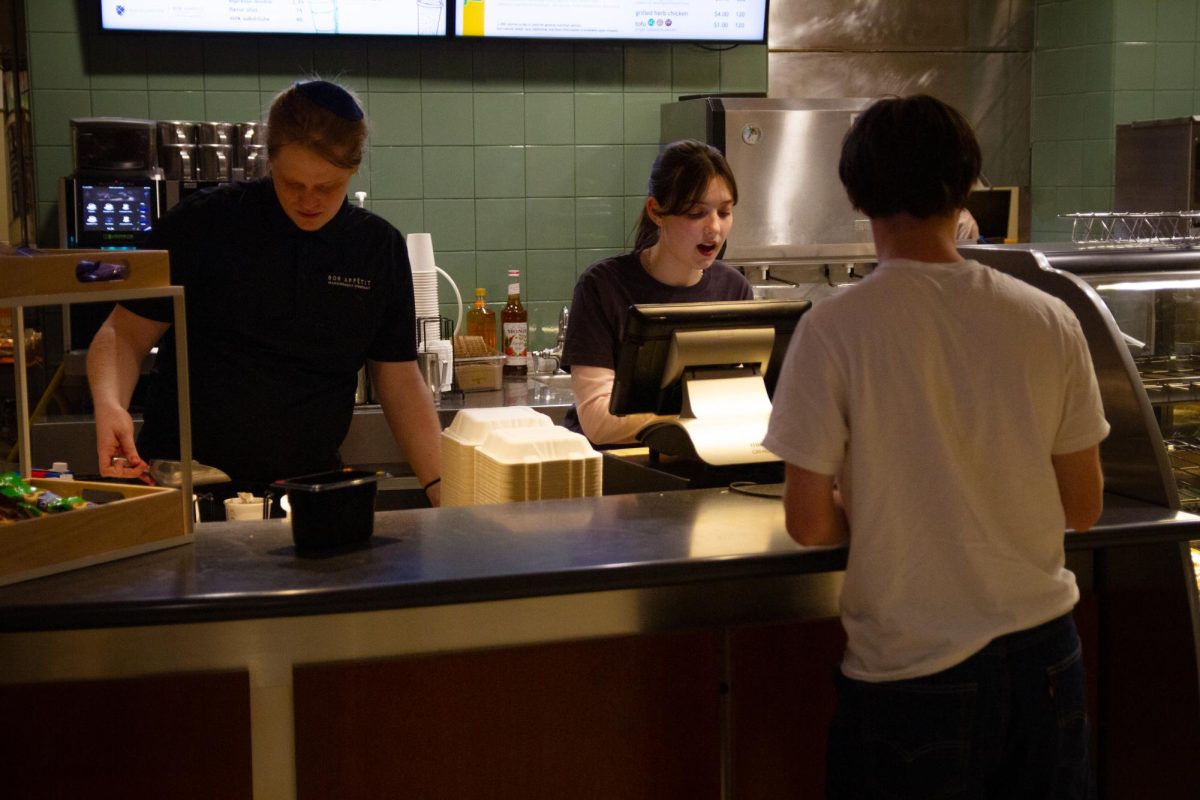Five years ago, several Macalester Bon Appétit workers started a push to unionize — one of many past attempts. All too soon, COVID-19 intervened. Some of the organizers were laid off, and union efforts stagnated — until last spring, when workers took up the cause once again. This time, they succeeded. On Thursday, March 21, the general manager of Bon Appétit Macalester, Amy Tomes, formally announced that the branch’s workers had formed a union.
Bon Appétit is the company that oversees Cafe Mac and Macalester’s satellite dining stations and caters college events. It employs both full-time workers and students. Most student workers in Cafe Mac are employed through Macalester; they are not part of Bon Appétit, nor are they members of this union.
Nationwide, branches of Compass, Bon Appétit’s parent company, have been unionizing. In order to improve their pay, benefits, training and more, Macalester’s branch of Bon Appétit — separately from the Macalester Undergraduate Workers’ Union’s (MUWU) efforts to unionize all student workers — followed suit.
Maxine Rand ’21, a Bon Appétit barista and union organizer, was motivated to join the union when she heard about the health insurance benefits it seeks to win. Macalester’s Bon Appétit workers do not currently get healthcare deductibles.
“My first thought after hearing about the union was, ‘well, is the health insurance going to be better?’” Rand said. “Health insurance is a big deal for me.”
When Rand had free time at work, she began talking to coworkers about the unionization efforts. She explained to them that the union aimed to get them better healthcare benefits.
“Affordable health insurance in this country is not easy to come by, especially for a food service position,” Rand said. “Being able to secure that through a union is a big deal for a lot of people.”
Rand also spoke with her co-workers about the wage increases that the union hopes to win. Around the start of this calendar year, Macalester Bon Appétit workers received pay raises of about 3%, which is less than the rate of inflation. Many workers were upset by this, which led some to sign a union card.
Pay raises aren’t Bon Appétit workers’ only wage-related concern. Some feel that the differences in wages among different positions are unfair.
“When you look at the wages among people who are doing either the same job or different jobs, it doesn’t seem to track with how much work they’re putting in,” Henna Schecter ’26, a Bon Appétit barista and union organizer, said.
“There are people who have worked here for around ten years who are being paid less than people who got hired this year, so there’s been a lot of want to have more fair wages, and then higher wages overall.”
Schecter has also faced issues with a lack of staffing and training. Macalester’s branch of Bon Appétit is understaffed; people don’t want to work there because of the low pay, Schecter explained. Because of understaffing, she often has to pick up duties that aren’t part of her job description, and for which she has not been trained.
“I’m a barista, and I work as a barista maybe 70% of the time,” Schecter said. “The rest of it is doing floor, serving. I’ve worked in the dishroom a few times. One of my coworkers makes sauces in the back for most of their shift — [these] things are not part of their job descriptions. That’s not our responsibility. There should be enough staffing to cover that. If I am expected to do other jobs, then I should be at least trained in what those jobs are.”
The hope that the union will fix these issues drove a majority of Macalester Bon Appétit workers to sign a union card.
“Most people thought that it was a no-brainer if [it would bring] better wages and health insurance,” Rand said.
However, there are still some workers who oppose the union. These individuals tend to be concerned about paying dues and worry that a union will speak for them rather than giving them a voice. According to Schecter, they also dread the extra effort of working with a union.
The Mac Weekly was unable to reach any of these workers for comment. Roxy, a Bon Appétit barista and union organizer who asked to be identified by her first name only, emphasized the role that low-income transgender women like herself played in forming this union. She and another Bon Appétit student worker, who is a low-income trans woman, put in a lot of work doing outreach and getting a large percentage of cards signed for the union. This work helped the new union push get a head start and eventually succeed.
In Roxy’s experience, being a Macalester student and student worker is harder for low-income trans women.
“We’re stuck in a cycle of poverty that is right at Macalester and right at a school that has so much wealth,” she wrote in a text to The Mac Weekly. “A shit ton of the people who are hired on to Bon App are low-income trans people and a ton of dropouts at Macalester are low-income trans people. Without the work of those people, this union would not exist.”
Schecter predicts that the effect of the Bon Appétit union on the average Macalester student will come in the form of better-quality service.
“Hopefully, higher wages will make higher employment, which will mean we’re not understaffed, which will mean our ability to serve students will go up,” she said. “There’s a lot of talk about the food being bad. It’s bad not because the cooks are bad at their jobs: it’s because they don’t have time to do the things that are necessary.”
Schecter also said that the variety of food available on weekends could increase if more workers were hired as a result of the union.
Schecter believes that MUWU and the Bon Appétit workers’ union, though separate, hold intertwined goals.
“Any organization efforts on campus are aided by additional organization efforts,” Schecter said. “[As] more people are talking about unions and are seeing benefits from unionization on campus, [they] will hopefully be able to apply that to their workplace and what they could see from a [union].”
Although Macalester Bon Appétit workers now have a union, they still have the contract bargaining process ahead of them. Schecter is optimistic about the next steps.
“[Getting the union] is definitely a little exhilarating,” Schecter said. “We’ve been working on this for a while, and I think it is going to make substantial change. The first step [was] getting a union, and the second step is bargaining and actually using that collective power to change things, but I think that we’ve done a good job setting up a process where we can make change.”











